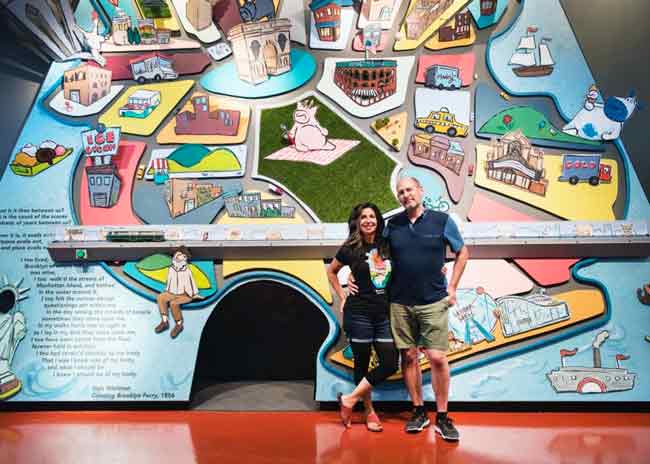In 2011 Jackie Cuscuna and her husband Brian Smith opened their dream: Ample Hills Creamery, an ice cream shop chain headquartered in Prospect Heights, Brooklyn, N.Y. Within a few years they had 13 shops, 10 of which were in New York City, one in Los Angeles, and two in Florida, (one in Disneyworld), and had rave reviews from Oprah Winfrey.
But by 2020, the couple had declared bankruptcy, unable to keep up with their financial obligations.
In a rare turn of fate, recently Cuscuna and Smith bought back their company from Schmidt Industries (which purchased it out of bankruptcy for $1 million) for $150,000 and are reopening stores. Cuscuna talks to rd+d about best practices for emerging from bankruptcy and what they could have done differently.
1. Don't think too big
Once they'd opened so many stores so quickly, the couple realized they needed a bigger production area.
So they rented a space in Red Hook, Brooklyn, and turned it into a factory with a retail shop, a museum and a party space with interactive exhibits. "We thought that would be the greatest thing to do," says Cuscuna. "But unfortunately that was the biggest problem and was what led us to go into bankruptcy."
The first problem was they'd never built a factory before and didn't know how much it was going to cost. Consequently they went $2 million over budget for a total of $7 million. Then their expediter had legal problems, causing delays.
And once the factory was up and running, it produced more ice cream than they could sell. "We thought we'd open a couple more [stores] but we didn't realize we needed at least 25 shops to make the factory to make sense," Cuscuna says. "So we went on a wild frenzy of trying to open up more shops."
2. Believe in yourselves
In the past couple of years, Cuscuna and her husband starting thinking about making a comeback when they saw Schmidt Industries, which is publicly traded, was having financial problems.
"We knew we had built something special and we knew we had more fight left in us," Cuscuna says. "And the things that made us happy, which were ice cream and community and gathering spaces, still existed, so we asked ourselves how do we strategize to make this happen. What are our options and how can we market ourselves?"
3. Start again slowly
After declaring bankruptcy, the Ample Hills owners found other investors willing to work with them and in May 2021 they opened The Social in Brooklyn. "We started completely over again," says Cuscuna. They still had their original recipes, she says, but Smith had dabbled with them in the years in between. The Social was unaffiliated with Ample Hills.
 The Social offers an array of creative, house-made flavors including Cap’n Crunch-infused ice cream with clusters of Fruity Pebbles.Since then, they bought back the company and have reopened four more stores — the final one opened in Astoria, Queens, last month. And one of which, in Industry City, Brooklyn, has their new production facility, which opened in mid-June.
The Social offers an array of creative, house-made flavors including Cap’n Crunch-infused ice cream with clusters of Fruity Pebbles.Since then, they bought back the company and have reopened four more stores — the final one opened in Astoria, Queens, last month. And one of which, in Industry City, Brooklyn, has their new production facility, which opened in mid-June.
The key now is producing just the right amount of ice cream in the production facility for the shops they have, Cuscuna says. "We want to make sure each shop is operating efficiently and properly then the plan is to open more shops, but slowly."
Unfortunately, she says, they're doing something they feel is wrong and trying to get some more shops open during the summer. "It's counter-intuitive to all the lessons we've learned but we understand the need for it because we need the cash flow at this time. It's a hard psychological thing for us to wrap our heads around."
4. Have some savings
When Schmidt Industries bought Ample Hills out of bankruptcy for $1 million it was actually worth $20 million but "when a company goes into bankruptcy, the people who are paid are the creditors so we don't get any money," says Cuscuna. Part of the problem was they didn't understand the different kinds of bankruptcies, such as Chapter 11 and Chapter 7, Cuscuna says.
So they declared Chapter 11, which was very expensive (around $850,000) "and the only money you're getting is the money to pay back the lawyers." Their fear was that they'd declare Chapter 7, which is complete liquidation, and the entire company would have dissolved. "it would have been really sad to see it completely disappear," says Cuscuna.
5. Examine what your investors want
In the first round, Ample Hills' investors wanted the company "to grow, grow, grow," says Cuscuna, "and they didn't care about the profitability yet." Now, Ample Hills has just three investors who want to ensure each shop is profitable, "so I appreciate going more slowly, more methodically and carefully," she adds.
"It's a lot less, so it's easier to keep control. We meet with them frequently and talk to them all the time and they're very involved and provide advice."
6. Focus on the numbers
Now, says Cuscuna, "I'm much more focused on making sure the numbers work and are healthy. If you don't have a financially healthy business you don't have a business."




